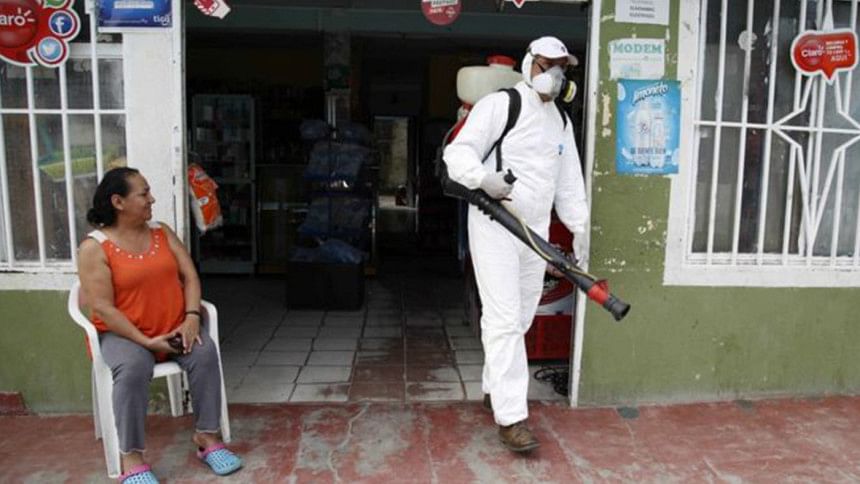Colombia links Zika to rare nerve disorder deaths

Colombia says three people have died after contracting the Zika virus and developing a rare nerve disorder.
Health Minister Alejandro Gaviria said there was a "causal connection" between Zika, the Guillain-Barre disorder and the three deaths.
Earlier, Brazilian scientists said they had detected for the first time active samples of Zika in urine and saliva.
However, it is not clear whether the virus can be transmitted through bodily fluids.
Zika, a mosquito-borne disease, has been linked to cases of babies born in Brazil with microcephaly - underdeveloped brains.
"We have confirmed and attributed three deaths to Zika," said the head of Colombia's National Health Institute, Martha Lucia Ospina.
"In this case, the three deaths were preceded by Guillain-Barre syndrome."
Guillain-Barre is a rare disorder in which the body's immune system attacks part of the nervous system. It isn't normally fatal.
Ospina said another six deaths were being investigated for possible links to Zika.
"Other cases (of deaths linked to Zika) are going to emerge," she said. "The world is realising that Zika can be deadly. The mortality rate is not very high, but it can be deadly."
Gaviria said one of the fatalities took place in San Andres and the other two in Turbo, in Antioquia department.
UK virologist Prof Jonathan Ball, of the University of Nottingham, told the BBC: "We have been saying Zika has been associated with Guillain-Barre. One of the complications of that could be respiratory failure. But it is still probably a very rare event."
Although Zika usually causes mild, flu-like symptoms, it has been linked to thousands of suspected birth defects. However, it has not yet been proved that Zika causes either microcephaly or Guillain-Barre.
The main method of infection is via mosquito bites but scientists in Brazil say tests on two patients revealed Zika can be found in other body fluids.
Paulo Gadelha, the head of Brazil's Fiocruz Institute which is part of the Ministry of Health, said: "The presence of the active Zika virus has been found in saliva and urine.
"But that does not mean there is a capacity for transmission through saliva and urine."
Traces of Zika's genetic material were detected in saliva and urine during the 2013 outbreak in French Polynesia, but the Brazilian authorities say this is the first time "active" virus has been detected.
Oswaldo Cruz, also from Fiocruz, added: "It means the virus is active, capable of infecting a cell so this is completely different, it means that the virus is functional."
Brazil has seen 4,783 suspected cases of babies born with small brains, although only 404 of them have been confirmed, 709 have been rejected and 3,670 are still being investigated.
Meanwhile, the US has advised men to abstain from sex or use condoms after visiting affected countries, if their partner is pregnant.
The US Centers for Disease Control believes a recent case of Zika was spread through sex.
The updated advice says avoiding mosquitoes remains the best way to prevent infection, but advises men returning from affected countries to "correctly use condoms during sex or abstain from sexual activity for the duration of the pregnancy".
Meanwhile, the governor of Puerto Rico has declared a public health emergency over Zika. The US territory has 22 confirmed cases.

 For all latest news, follow The Daily Star's Google News channel.
For all latest news, follow The Daily Star's Google News channel. 








Comments